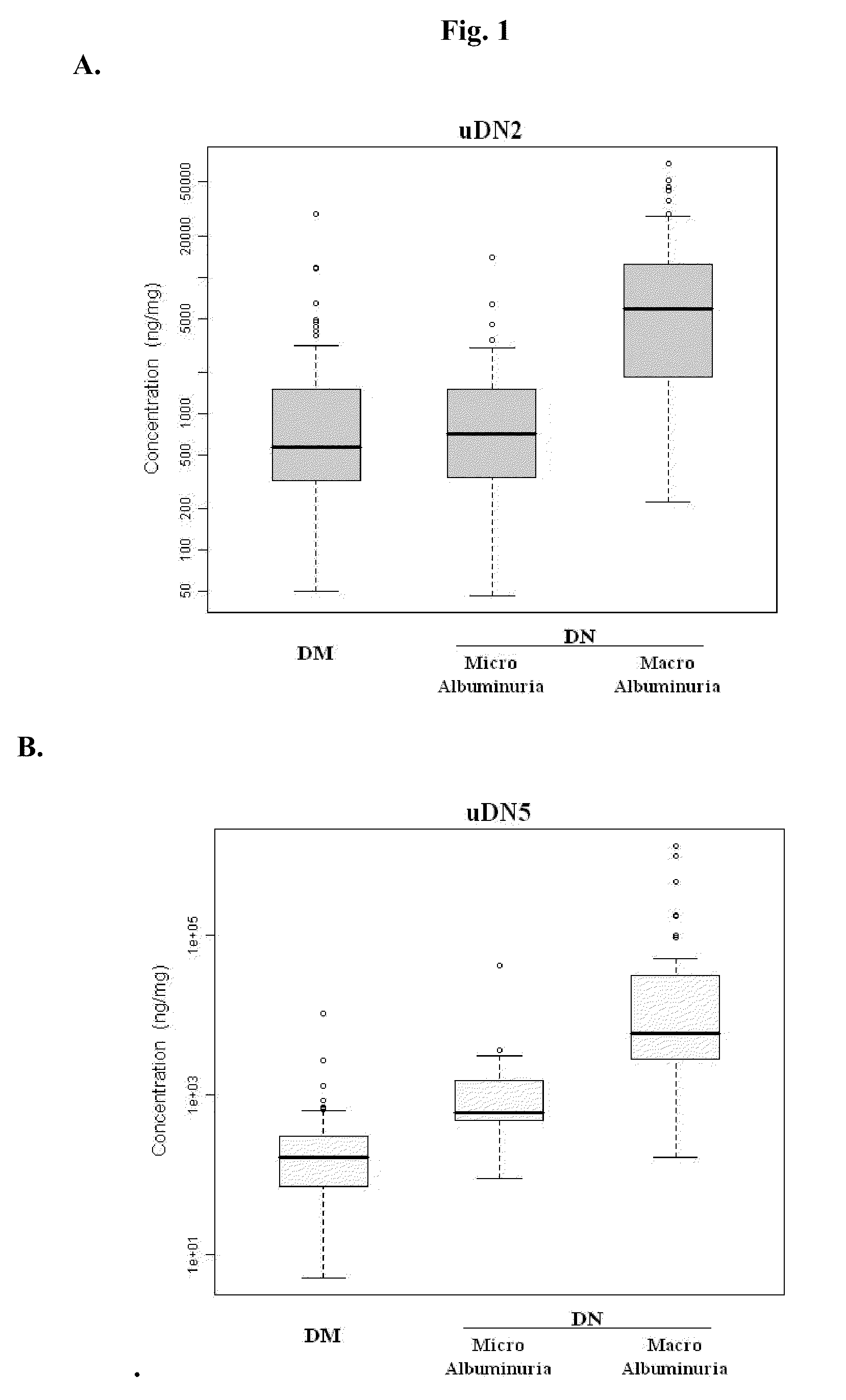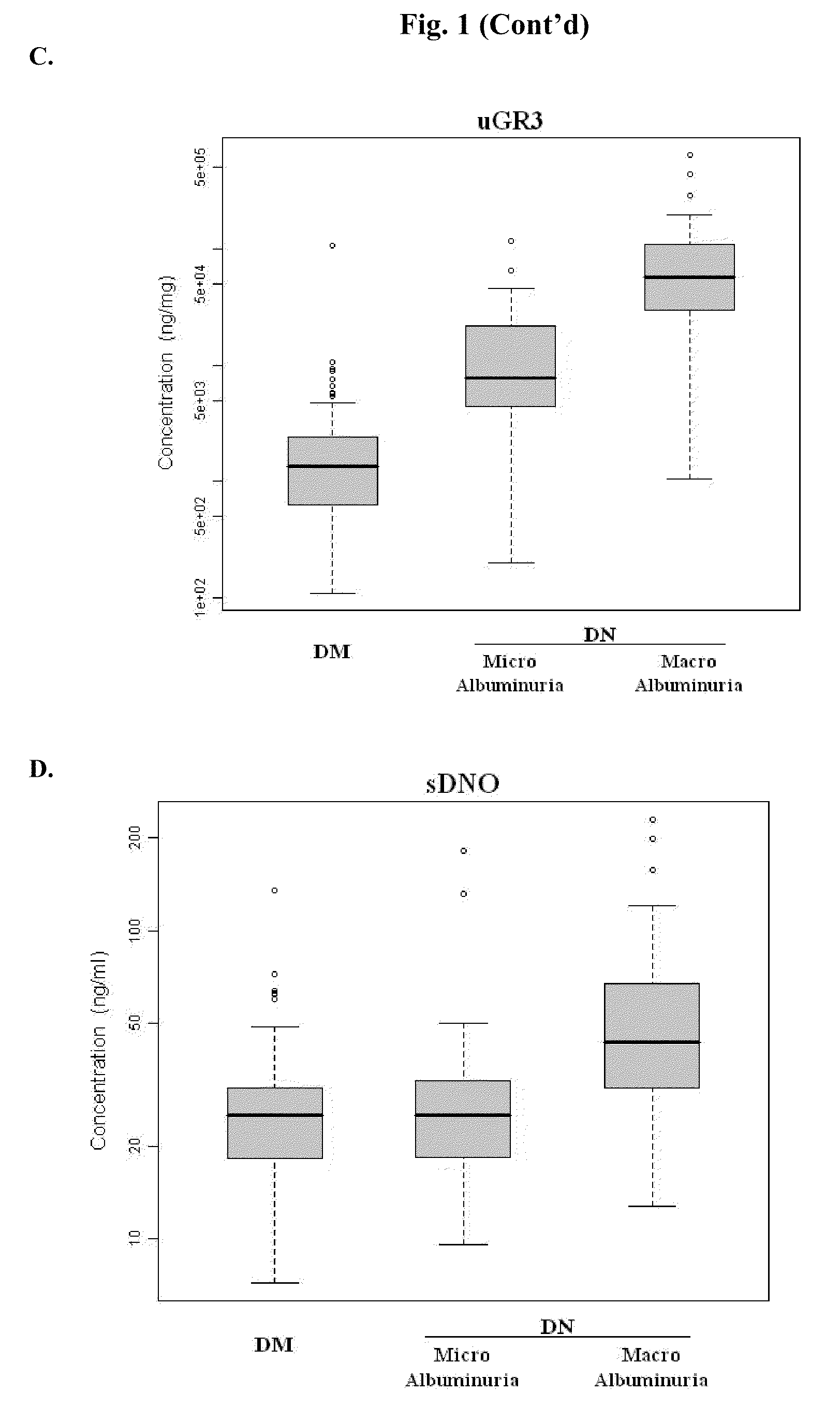Urine and serum biomarkers associated with diabetic nephropathy
- Summary
- Abstract
- Description
- Claims
- Application Information
AI Technical Summary
Benefits of technology
Problems solved by technology
Method used
Image
Examples
example 1
Diagnosing DN Based on Urine Alpha-2-HS-Glycoprotein, Urine Alpha-1 Antitrypsin, Urine Alpha-1 Acid Glycoprotein, or Serum Osteopontin
Material and Methods
(i) Subjects
[0055]83 diabetic mellitus patients (designated “DM subjects”), and 82 DN patients (designated “DN subjects”) were recruited at the Tri-General Military Hospital in Taipei, Taiwan, following the standards set forth by the American Diabetic Association and also described below:
[0056]DM: suffering from diabetic mellitus but free of DN (see the standards described below);
[0057]DN: suffering from diabetic mellitus and secreting urinary protein at a level greater than 1 g per day, having DN as proven by biopsy, or having uremia.
[0058]All of the subjects were assigned into a training group and a testing group at a ratio of 7:3.
(ii) Sample Collection and Processing
[0059]First-morning-void urinary samples and serum samples were collected from each of the subjects mentioned above. Peptides contained in the urine samples were exa...
example 2
Staging DN Based on a Combination of uDN2, uDN5, uGR3, uDNO, and sDNO
Two Protein Model
[0067]The combined levels of two of uDN2, uDN5, uGR3, uDNO, and sDNO in DM subjects, and DN subjects were subjected to discriminant function analysis, logistic regression analysis, and ridge regression analysis. The results from this study indicate that any combination of two of the five proteins or their fragments can be used as reliable markers for determining DN stages.
[0068]Shown below is an exemplary two-protein model, i.e., uDN5 and uGR3, including equations for calculating disease scores based on the combined levels of these two protein molecules. Also shown below are tables (i.e., Tables 4-9) listing cutoff values, sensitivities, specificities, positive predictive values (PPV) and negative predictive values (NPV), and area under the ROC curve (AUROC) for this two-protein model.
Discriminant Function Analysis:
[0069]
Disease Score=0.3303×log2[uDN5](ng / mg)+0.2732×log2[uGR3](ng / mg)+5
TABLE 4Cutoff...
example 3
Staging DN Based on a Combination of uDN2, uDN5, uGR3, and Age
[0090]Shown below are equations for calculating disease scores determined by discriminant function analysis, factor analysis, logistic regression analysis, and ridge regression analysis, based on the level of a biomarker composed of three protein molecules, i.e., uDN2, uDN5, and uGR3, and one clinical factor, i.e., age. Also shown below are tables (i.e., Tables 34-41) listing cutoff values, sensitivities, specificities, PPVs, NPVs, and AUROC for this model.
Discriminant Function Analysis:
[0091]
Disease Score=0.3342×log2[uDN5](ng / mg)−0.0201×log2[uDN2](ng / mg)+0.2826×log2[uGR3](ng / mg)+0.0059×Age(year)+5
TABLE 34Cutoff Values Representing DN Early and Late Stages Indicated byUrine Albumin LevelsTraining set (n = 118)Testing set (n = 47)DM, MicroDM, Microalbuminuriaalbuminuriavs.vs.MacroMacroDM vs. DNalbuminuriaDM vs. DNalbuminuriaCut-off11.51512.08811.51512.088Sensitivity (%)9393100100Specificity (%)90907779PPV (%)90838375NPV (%...
PUM
 Login to View More
Login to View More Abstract
Description
Claims
Application Information
 Login to View More
Login to View More - R&D Engineer
- R&D Manager
- IP Professional
- Industry Leading Data Capabilities
- Powerful AI technology
- Patent DNA Extraction
Browse by: Latest US Patents, China's latest patents, Technical Efficacy Thesaurus, Application Domain, Technology Topic, Popular Technical Reports.
© 2024 PatSnap. All rights reserved.Legal|Privacy policy|Modern Slavery Act Transparency Statement|Sitemap|About US| Contact US: help@patsnap.com









